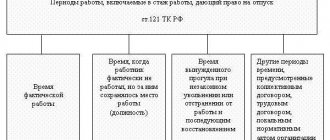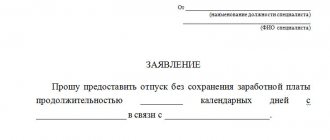Summer holidays and legislation
The right to vacation is guaranteed by the Labor Code of the Russian Federation, a number of its articles developing Art. 37 of the Basic Law of the Russian Federation. It talks about the human right to rest and annual leave.
Paid holidays are discussed in Art. 122 of the Labor Code, and about vacation at your own expense - in Art. 128. Moreover, both articles contain the obligation of the administration to provide vacations in the summer to certain categories of citizens. They are either included in the text of the articles, or are contained in references to other federal laws, regulations, articles of the Labor Code itself, which serve as the basis for such benefits.
The rules governing the right to choose annual leave in the summer are also contained in the Labor Code of the Russian Federation in Art. 286, 123, 267, etc., some Federal Laws and regulations. Thus, the legislative framework for providing priority vacation in the summer is quite extensive.
When you can't refuse
As mentioned earlier, labor legislation establishes cases in which management will not be able to restrict an employee on extraordinary leave:
- a pensioner working officially for a period of up to fourteen days annually;
- disabled person for up to sixty days each year;
- employees whose spouse died in the state civil service - for up to fourteen days;
- employees who have had a child or a close relative die – up to five days.
ATTENTION !!! Difficulties arise in determining the circle of close relatives. According to the Civil Code of the Russian Federation, relatives of the first two lines of inheritance (parents, children, spouse, grandparents, brothers) are considered close. However, in practice, another relative can also be recognized as a close relative. The key will be their level of relationship.
Thus, for example, a stepfather can be recognized as close. It is also worth noting that all of the specified periods do not have a lower limit, which means vacation can be granted for 1 day.
The list enshrined in Art. 128 of the Labor Code of the Russian Federation is not closed.
Other cases of granting unpaid leave are stipulated in other articles and regulations:
- Art. 173 and 174 of the Labor Code of the Russian Federation establish the right to leave in connection with admission and passing exams at a university;
- if there are children under fourteen years of age, or a child with a confirmed disability under eighteen, the employee can be confident in the freedom to take leave at any time for up to fourteen days. (Article 263 of the Russian Labor Code).
Some other Federal laws establish mandatory unpaid leave for civil and municipal employees, spouses of military personnel, participants in the Great Patriotic War, war veterans and some others.
There is often an opinion that according to the Labor Code of the Russian Federation or after maternity leave, the employer is obliged to provide unpaid leave. Based on Article 128 of the Labor Code of the Russian Federation, this is not so and there is no such basis, so you will have to negotiate on your own. The situation is similar with care for health reasons, so if the employer refuses, you should take sick leave.
Who benefits from the benefit?
Employees who have a priority right to paid vacation in the summer are:
- adoptive parents of children under 3 months (Article 122 of the Labor Code of the Russian Federation);
- maternity leave, before (after) leave under BiR (Articles 122, 260 of the Labor Code of the Russian Federation);
- husbands of women on leave under BiR (Article 123 of the Labor Code of the Russian Federation);
- workers who have not reached the age of majority (Articles 122, 267 of the Labor Code of the Russian Federation);
- spouses of a person in military service (Federal Law 76 Art. 11-11);
- working disabled people, WWII veterans, workers of military facilities during the WWII, blockade survivors” (FZ-5, art. 14, 16, 17,18, 19);
- heroes of the Soviet Union and Russia (FZ-4301-1, art. 8);
- part-time workers if they have summer vacation at their main job (Article 286 of the Labor Code of the Russian Federation);
- honorary donors (Federal Law-125 Art. 23-1-1);
- fathers and mothers with many children, parents of children with disabilities (Articles 262.1, 262.2 of the Labor Code of the Russian Federation).
In addition, according to Art. 128 of the Labor Code of the Russian Federation, the right to go on vacation at their own expense at any convenient time, not excluding summer, has:
- WWII participants who continue to work;
- old age pensioners;
- family members of a military personnel;
- disabled workers;
- workers for family reasons, for example, the birth of a child, marriage;
- parents of minors - in some cases.
Each category has its own limit on the provision of leave. One of the most common cases of going on vacation in the summer without pay is for family reasons. Its duration is up to 5 days.
Attention! If an employee has been recalled from annual leave, he has the right to use the remainder during the summer period out of turn (Article 125 of the Labor Code of the Russian Federation).
Parents with children should talk in more detail about extraordinary leaves.
Possible reasons
The employer cannot refuse scheduled leave; it can only be rescheduled with the consent of the worker. However, if a worker decides to take leave whenever he pleases and he is not a citizen with certain benefits, then the boss has the right to deny leave.
Situations in which there may be a conversation about refusing (postponing) vacation:
- The worker’s desire to postpone his vacation to another date (possible only with the consent of his superiors);
- Problems in the organization that interfere with the worker’s vacation;
- If a worker asks to divide the vacation into parts for subsequent rest, for example, in winter and summer.
In other cases, a refusal to grant leave will violate the Labor Code of the Russian Federation.
If you need to go on vacation, even if you are not allowed to go on vacation, you can simply not go to work. But this applies only to those employees whose vacation is approved in the vacation schedule . It is necessary to write an application for leave, according to the approved dates, and register it with the secretary.
Thus, the employer is considered to have been notified of your intention to take legal leave.
Families with minor children - special attention
First of all, we are talking about fathers and mothers with many children who have children under 12 years of age. Their right to take paid leave out of turn in the summer is guaranteed by Art. 262.2 Labor Code of the Russian Federation. The father and mother have the right to take such leave simultaneously or separately, each of the parents. If one of the spouses has already used summer leave, this does not deprive the other parent of the right to benefits.
The question of the vacation schedule, which is approved in advance, and how to combine the requirements of the law with this document, is ambiguous. A number of experts believe that parents with many children are obliged to decide on vacation in advance, and taking this information into account, the personnel service draws up a vacation schedule. Other jurists believe that Art. 262.2 does not oblige parents to do this; they can take leave at any time without notifying them in advance. Today, judicial practice is in favor of the second option.
According to Art. 123 of the Labor Code of the Russian Federation, if vacation is provided according to a schedule, you do not need to write an application for it. Accordingly, if a father or mother with many children decides to take a summer vacation and the schedule does not contain this information, an application is required.
A similar rule is contained in Art. 262.1 TK. We are talking about parents of disabled minors. They can also take paid annual leave at any time, including in the summer, but here we are talking about only one of the parents. The blood parents of a disabled person and guardians, trustees of the child, and adoptive parents have equal rights.
Additional unpaid leave in the summer can be provided to parents in the following cases (according to Article 263 of the Labor Code of the Russian Federation):
- if the employee has 2 or more children under 14 years of age;
- if the employee has a disabled child under 18 years of age;
- if a child under 14 years of age is raised by a single mother or a father without a mother.
Such leave must be provided for in the collective agreement and provided upon application by the employee for a period of up to half a month (14 days).
Appealing an illegal decision
If the employer refuses to provide leave, and the employee is convinced that such a decision is unfounded, he has the right to appeal the actions of management to the Labor Inspectorate.
This is also important to know:
When vacation pay is paid: how it is calculated, liability for violation of payment deadlines
Appeal procedure:
- Drawing up 2 applications requesting leave.
- Sending one letter to the employer (by registered mail so that notice remains), submitting the second application to the Labor Inspectorate.
- Making a photocopy of the approved vacation schedule and sending it to the Labor Inspectorate inspector.
In 70% of cases the case is resolved pre-trial. If an employee believes that the body monitoring the implementation of labor legislation has not taken the necessary actions to protect his rights, he has the opportunity to go to court to resolve the conflict.
How to confirm and exercise the right to leave
The preferential right to leave is confirmed by providing the relevant documents. Thus, parents with many children provide birth certificates for their children, pregnant women and their spouses - certificates from a medical institution, adoptive parents - adoption documents.
If summer vacation is not included in the schedule, an application from the employee is required. Otherwise, according to Art. 123 of the Labor Code of the Russian Federation, it is not the employee who must remind the administration about the start time of the vacation, but the management - notify the employee about the onset of the summer vacation, against signature, 2 weeks before it starts.
At the same time, there are often cases when an employer ignores the legal demands of employees and refuses to provide them with vacation in the summer. If mutual understanding cannot be reached, the employee has the opportunity to contact the labor inspectorate or the judicial authorities to exercise his rights.
Who should not be given leave?
You cannot refuse leave:
- minors;
- pregnant women before or after maternity leave;
- persons who have adopted a baby under three months of age;
- the spouse of a woman on maternity leave;
- other categories of workers provided for by law.
For the listed persons, the privilege of receiving leave has been established; they do not even need to wait for it to arrive according to the schedule; it is enough to write an application to the employer requesting its provision. This application cannot be denied.
It is prohibited to not provide leave during the year to persons who have not reached the age of majority or who work in harmful and dangerous conditions.
Vacation cannot be rescheduled for two years in a row, that is, if an employee’s vacation has already been rescheduled once, then when the time comes for the second time, it cannot be rescheduled again, even with the employee’s consent.
For employees who do not have any privileges in terms of receiving leave, it is provided and transferred on a general basis.
Briefly
- Extraordinary paid leave in the summer can be provided to parents of large families with children under 12 years of age, the father or mother of a disabled minor, as well as a number of employees of various categories on the basis of articles of the Labor Code of the Russian Federation and federal laws: adoptive parents, maternity leavers and their husbands, minor employees, WWII veterans, husbands and wives of military personnel, honorary donors and some others in accordance with the legislation of the Russian Federation.
- Unpaid summer leave can also be provided at the request of employees with children under 14 years of age or one child if he is being raised only by a father or a single mother; parent of a disabled person under 18 years of age. Employees on the occasion of marriage, the birth of a child, the funeral of loved ones, disabled workers, pensioners and other citizens mentioned in legislative acts corresponding to their status are entitled to it.
- Preferential rights to summer vacation can also be granted by agreement with the employer.
Rights of vacationers: can vacation be denied if an employee wants to take it out of schedule?
This and other questions were answered during a direct line by specialists from the Minsk regional organization of the trade union of healthcare workers: chairman of the regional committee Alexander SHAMAL, deputy chairman of the regional committee Natalia ZEZETKO, chief legal labor inspector Igor ANISCHENKO and chief technical inspector Sergei CHURININ.
– Do labor legislation provide for any restrictions when granting an employee leave without pay?
Anna S., Soligorsk Central District Hospital
- The employer may, but is not obligated to, provide unpaid leave to the employee. In Art. 190 of the Labor Code (LC) stipulates that leave without pay can be granted for family and domestic reasons (for working on a dissertation, writing textbooks and for other valid reasons) during a calendar year for a period of no more than 30 calendar days upon a written application from the employee , unless otherwise provided by the collective agreement, agreement, employer. The validity of the reasons is assessed by the employer (unless otherwise established by the collective agreement or agreement).
For some categories of employees (according to Part 1 of Article 189 of the Labor Code), the employer is obliged to provide leave without pay for up to 14 calendar days:
– women who have two or more children under the age of 14 or a disabled child under the age of 18;
– veterans of the Great Patriotic War and veterans of military operations on the territory of other states;
– employees caring for a sick family member in accordance with a medical report;
– disabled people working in factories, workshops and areas specially designed for the work of this category of citizens;
– other employees in cases provided for by law, collective agreement, or agreement.
– What is the procedure for granting labor leave, as well as leave at their own expense to those who work part-time?
Alexander K., Volozhin
- In accordance with Art. 347 of the Labor Code, labor leave for part-time workers is granted simultaneously with labor leave for their main job. If a person has not worked at a part-time job for 6 months, then he is given leave in advance. When the duration of leave at a part-time job is less than at the main place of work, the employer, at the request of the employee, provides him with social leave of the appropriate duration without saving his salary. If part of the part-time worker’s leave exceeds the leave for the main job, then it can be replaced by monetary compensation by agreement between the employee and the employer.
Providing a part-time employee with social leave (for valid reasons of a personal and family nature) without maintaining salary is regulated by the norms of 190 Labor Code (explained in the previous answer. - Author's note).
– Does the employer have the right to refuse to provide an employee with labor leave within the period provided for in the relevant schedule?
Olga V., Starodorozhsky Central State University of Hygiene and Economics
- When drawing up a vacation schedule, the employer takes into account the employee’s opinion about the time of his going on vacation, if this does not interfere with the normal activities of the organization and the exercise of the right to vacation of other employees. Thus, if vacation is scheduled, it is provided on time. Providing leave for a different period is permissible only if such an agreement is reached between the employee and the employer.
At the same time, the employer has the right to grant early leave to all or certain categories of employees in the event of an unexpected suspension of work due to an accident, natural disaster, lack of energy resources, raw materials and other exceptional and unforeseen circumstances (according to Article 172 of the Labor Code).
If labor leave is granted in compliance with the established procedure, but the employee refuses to use it without legal grounds, then the employer has the right to refuse to transfer the leave and not pay monetary compensation for unused leave (Article 173 of the Labor Code). This is permissible except in cases where the employee quits without using his vacation or using it partially.
– Upon dismissal by transfer, a colleague was left with an unused portion of his vacation.
Does he have the right to use it while working for another employer? Or is the previous employer obliged to pay compensation? Marina K., Minsk Central District Hospital
- Upon dismissal, regardless of its grounds, an employee who has not used or has not fully taken advantage of the labor leave is paid monetary compensation (Part 1 of Article 179 of the Labor Code). Therefore, upon dismissal by transfer to another employer, the previous employer is obliged to make a final payment on the day of dismissal, including payment of compensation for unused vacation.
A person hired by way of transfer has the right to be granted labor leave without waiting for 6 months of work, and may demand leave of the full duration with payment for all days.
Veronica SOLOVEI, information portal of the Federation of Trade Unions of Belarus
For how long can unpaid leave be granted?
The current Labor Code of the Russian Federation establishes the duration of vacation for certain social groups. For others, this question remains vague. As a general rule, the duration of the vacation will depend on the consensus reached between the employee and the manager.
If an employee has several grounds for compulsory annual unpaid leave, you should not count on multiple vacations. Although this issue is not regulated in any way by law, in practice there is a custom according to which a term will be granted annually for the maximum of the grounds.
Each employer keeps records and statistics of vacations provided.
There are several reasons for this:
- makes it possible to refuse multiple leave within one year, although as a general rule leave should be granted;
- The length of service will depend on the number of days of unpaid leave spent. According to Article 121 of the Labor Code of the Russian Federation, the employee’s length of service will increase, and with it the annual paid leave, if in one calendar year the employee has not spent more than fourteen days on vacation at his own expense. If this period is not included, the working year will be increased by the corresponding number of days.
Return of an employee from vacation at the request of the employer
This issue is in no way regulated by the Labor Code of the Russian Federation. However, in accordance with Art. 125 of the Labor Code of the Russian Federation, an employee is allowed to return from paid rest only with his consent.
The Labor Code does not contain a single rule providing for the application of the law by analogy; accordingly, such a provision is not mandatory with unpaid leave. Although, of course, if the parties reach an agreement, this option is possible. Thus, the employer’s unilateral decision to return an employee from vacation is illegal.
ATTENTION !!! In conclusion, it is worth saying that, as a general rule, this type of leave is provided by the employer without any problems if there are serious reasons. Therefore, you just have to submit an application and wait for the order. But the law stipulates situations when the manager does not have the right to choose: he is obliged to provide leave.
Annual unpaid leave of fourteen days or more is not counted toward seniority and will not count toward your next paid leave. It is worth remembering that unpaid leave is voluntary - under no circumstances can an employer force you to take such leave. Violation of this rule will entail the imposition of administrative liability on management.
View wider
As children, we dreamed of summer holidays: no school, complete freedom.
Dirty knees, bungees and a bicycle. Now we have grown up, there are no bungee games in sight, but we still wait for summer and get upset when it “passes by.” Just... why isn’t it expected? Yes, we have grown up and cannot afford to rest carefree for three months. But this does not mean that we should throw childhood memories out of our heads and deny ourselves simple joys.
And yes, unlike childhood, when many things were decided for us, now we are adults, and everything is in our hands. Try to regain the “ground under your feet” and the right to joy.
- Take a piece of paper and write down situations when you felt good. Don’t get attached to your vacation - remember everything, everything: weekends in nature, barbecues, a walk with your child in the park, dinner on the open veranda, warm summer rain.
- Check off what you could do on the list in the coming days. If other ideas come up along the way, write them in too. It can be little things - the main thing is that you want it.
| When I felt good not on vacation | What can you do again this week? |
| The department went to have lunch at the shopping center | Possible on Fri |
| We walked around the area in the evening and ate ice cream | Tomorrow |
| We went to the village to visit friends, went swimming at the quarry | I'll call and ask when they're leaving |
| I bought a bowl of cherries, watched a movie and ate them with the whole family. | Hmm, I’ll go to the market and see how much cherries are now |
Now you understand what you can do for yourself. If you feel that the list is incomplete, read the selection below. Maybe you will like something and add it to the table..
Employee position
By communicating with friends, colleagues from the business community, and also by conducting a survey of our clients on , we were able to get acquainted with their opinions on this matter. In particular, the questions were asked: “Tell me, when was the last time you were on vacation at your current place of work”? “How much longer are you willing to work without vacation?” “What will be your actions if you are denied leave after two years of continuous work”? Expecting that the answers would be approximately the same, the author was surprised that the situations are actually different and the case differs from case to case. Thus, the majority of respondents admitted that they try to go on vacation at the first opportunity, that they do not intend to work an extra month, and if they are directly denied vacation, they would prefer to quit rather than continue cooperation with their employer. The first thought that comes to mind is: “Guys, you live well.” But then comes the realization that not all of them know what amounts they will be owed upon dismissal, and even more so they do not know about the right to a “long” vacation after several years. After a number of counter-questions, the respondents agreed that next time it would be better to work longer and then, upon dismissal, they would be able to receive a good increase in wages. One of them even answered: “Heh, it’s even profitable to quit”... It’s not clear why so many people simply don’t know about this rule, because this is not their first job and they should have such experience was to be... Perhaps they were simply deceived. The most valuable information was provided to us by an employee from the labor inspectorate, who reported that there are often cases in their practice when, by any means, employees are not given leave for more than 48 calendar days, provided that they have been working continuously for more than two years in a row. On this subject, there is an old, but still entertaining letter from Rostrud dated 03/01/2007 No. 473-6-0, which states that an employee has every right to “take off” exactly as much vacation as he has not previously used. Perhaps now there is some other document that limits the rights of workers, but it never came to our attention, and for some reason the labor inspectorate did not want to say anything about this. In fact, not a single serious accounting and personnel publication has written an article on this subject recently, and the practice among directors remains the same. Maybe they know something, but don't talk about it? We believe that there is no point in building theories, but taking this rule as a given.
Don't limit yourself to summer
Summer lasts only three months, and that’s according to the calendar. Judging by the weather, many regions experience summer-like warmth for only a few weeks. But this is not a reason for sadness, because we can have our summer whenever we want. In June, September or November. We can go somewhere warmer, or we can not leave. We can eat croissants with coconut cream, swing on a swing or walk in the park. We can go on vacation whenever we want, simply because we are adults.
Expert - psychologist Anna Mukhaeva Prepared by editor Maria Skobeleva









